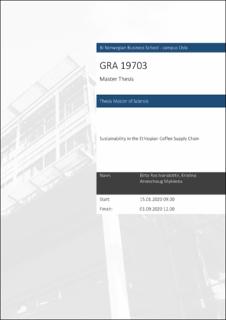Sustainability in the Ethiopian Coffee Supply Chain
Master thesis

View/
Date
2020Metadata
Show full item recordCollections
- Master of Science [1621]
Abstract
Coffee is one of the most important commodities in the world, and Ethiopia is
among the largest producers and exporters of coffee. A large share of Ethiopia’s
population is either directly or indirectly dependant on the coffee industry. There is
a recognition that companies are responsible for the social, environmental and
economic consequences of the operations of their supply chain. A minor change in
the coffee industry will have potential social, environmental and economic
consequences for Ethiopia and its population. This highlights the importance of
considering long-term sustainability of the Ethiopian coffee supply chain. Our aim
is to discuss how the Ethiopian coffee supply chain can become more sustainable.
To answer our research question, we conducted an exploratory case study. Our
primary data was collected through semi-structured interviews, informal
conversations, observations, field notes and visual data throughout a field trip to
Ethiopia. We combined our primary data with secondary sources. We assured
quality of our data and followed ethical guidelines.
Based on our findings we have mapped a general Ethiopian coffee supply chain,
consisting of the following steps: production, harvesting, primary processing,
Ethiopian Commodity Exchange, Control and Liquoring Unit, secondary
processing, domestic consumption, export and end-consumer. Further, we
identified the main challenges and opportunities in terms of sustainability along the
coffee supply chain. The main challenges and opportunities include smallholder
farmer restrictions, coffee quality, waste management, and aspects related to the
coffee price. Our findings reveal that the main improvement potential lies within
cooperatives and unions, certification schemes, the Ethiopian Commodity
Exchange, secondary processing and waste management.
In conclusion, we see that sustainability implications play an important role in the
overall sustainability of the Ethiopian coffee supply chain. Our contribution to the
field is a map of a general Ethiopian coffee supply chain, and an overview of some
of the main sustainability challenges and opportunities along the chain. In addition,
our research has detected areas in which the coffee supply chain can become more
sustainable.
Description
Masteroppgave(MSc) in Master of Science in Business, Logistics, operations and supply chain management - Handelshøyskolen BI, 2020